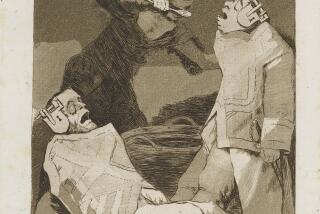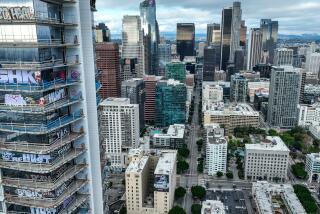Dave Hickey is back — and he’s still stirring things up
Art critic Dave Hickey has apparently emerged from his much-publicized art world retirement — and, some feel, not in the most auspicious way.
Hickey, who has a new book of cultural essays out called “Pirates and Farmers,” gave a talk and signed books Wednesday night at Grand Central Market, at an event sponsored by the Museum of Contemporary Art.
During the talk, Hickey, who’s known — and loved by some — for being provocative, apparently made a few comments that didn’t sit well with some in the audience.
CRITICS’ PICKS: What to watch, where to go, what to eat
Art writer and blogger Carolina A. Miranda tweeted her perspective with blow-by-blow groans in 140 characters or less during the event.
“Uh oh. This is where Hickey starts talking about identity politics. Apparently, identity politics killed the art underground,” she tweeted.
“According to Hickey, art was awesome until identity politics and artists teaching in universities started ‘raising consciousness,’ ” read another.
The artist Nayland Blake, who has several works in the Hammer Museum’s upcoming show “Take It or Leave It,” responded to Miranda on Twitter. “As a multi racial homo egghead, I sincerely apologize for breaking the art world.”
Los Angeles Times art critic Christopher Knight was at the event and had a very different take.
“[Hickey’s] position is not that art is now dull because of identity politics, as [Miranda’s] tweet suggests,” Knight said. “His position is that art is now dull because the academic institutionalization of identity politics coincided with the academic institutionalization of art. (That requires more than 140 characters to correctly tweet.)”
GRAPHIC: Highest-earning art executives | Highest-earning conductors
“Agreed. When you’re on Twitter, on a phone, there’s only so much you can get in there,” Miranda said later in an interview. “I didn’t have a beef with everything [Hickey] said. But identity politics did play a big part in his talk. He — and there are other art critics like him — get really wrapped up in this nostalgia of when the art world was smaller. I take issue with that because it’s a nostalgia for an art world that left a whole lot of people out because of race, gender, ethnicity and sexuality.”
When reached by phone Thursday, Hickey seemed unperturbed by the Twitter dust-up. He did say it was “kind of tacky that people were tweeting during my performance. I had no idea.”
Hickey said he thought Miranda and others might have misunderstood what he was trying to say about identity politics. True, he’s not a fan of it in the art world; but for a very specific reason.
“It tribalized and broke up the art underground,” he said. “It turned it into a tribe of women, a tribe of black people, a tribe of gay people. It used to be all of us, together, just down in the dirt.”
ART: Can you guess the high price?
On the phone, Blake added: “What feels like ‘all of us’ to one person feels very different to other people involved. I like Dave as a person and I respect him as a writer. But i think he’s not always aware of the conflicts that underlay things that he feels a nostalgia for. That community [of the ‘60s and ‘70s] was probably a lot more divided than he remembers it being.”
Hickey, a former gallerist who also was executive editor of Art in America, left his longtime home in Las Vegas — and art writing as a profession — several years ago; he now lives in Santa Fe, N.M.
Speaking about the art world in general, Hickey added, “We have a great big art world with a lot of stupid people in it. It’s just about sales. We don’t do negative reviews. We love everything. It’s all mainstream. Look at what’s out there. I don’t think that’s good, but that’s the way it is. I have nothing against identity politics, it didn’t ruin the art world, it just ruined it for me and [critic and artist] Jeremy Gilbert Rolf because we write about difficult art.”
Even before Wednesday night’s event, Hickey’s appearance had drawn attention. Modern Art Notes’ Tyler Green, who wasn’t at the talk but followed Miranda’s tweets, noted that MOCA used a questionable Hickey quote on its Tumblr page to publicize the reading.
PHOTOS: Arts and culture in pictures by The Times
“I think you want to learn about art because you had an experience of some sort — a totally non-redemptive but vaguely exciting experience like brushing up against a girl with big boobs in the subway,” the Hickey quote read atop the MOCA page.
MOCA wouldn’t comment on its promotional strategy; but Hickey had this to say:
“I don’t know why MOCA used that quote. They just wanted to be provocative. They’re all about headlines and tabloid hooks. There’s a little Jeffrey Deitch left in MOCA.”
Hickey’s talk and the reaction to it are part of a larger discussion about identity politics and gender inequality in the art world. The art magazine Artillery ran a feature this month called “Super Inequality: Micol Hebron challenges the gender ratio.”
“It’s timely because it still exists and in the art world,” says Artillery editor Tulsa Kinney. “In this day and age, it’s inexcusable because the art world should reflect a progressive world.”
L.A.’s Gabba Gallery will host a panel discussion Saturday featuring women artists from the gallery’s all-female show “Platforms and Paint.”
“It’s so tangible right now, inequality in the art world,” said Gabba’s Jaime Becker, who organized the panel. (Reporter’s note: I am the moderator).
“You see it in pricing of works, the preponderance of collecting works by male artists ... women artists are often treated as niche,” Becker said. “As a woman, as an artist, as a gallerist, I feel it. That’s why we wanted to have the show, to start a conversation.”
ALSO:
Monuments Men gallery to open at National WWII Museum
Museum’s Super Bowl bet shows pitfalls that come with Native art
Review: Alfredo Ramos Martínez, champion of ordinary people, revisited
MORE
PHOTOS: Hollywood stars on stage
PHOTOS: Arts and culture in pictures
More to Read
The biggest entertainment stories
Get our big stories about Hollywood, film, television, music, arts, culture and more right in your inbox as soon as they publish.
You may occasionally receive promotional content from the Los Angeles Times.











